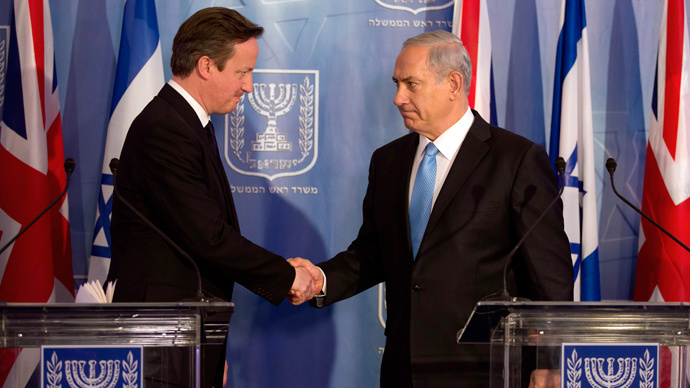Israel had ‘right to defend itself’ in Gaza war, says Cameron

UK Prime Minister David Cameron said Israel had a right to defend itself when it initiated Operation Protective Edge in Gaza last summer.
Cameron, who is in the midst of a re-election campaign, made the comments in an interview with the Jewish Chronicle due to be published on Thursday.
The prime minister said there was a clear “difference” between Gazan militant groups making “indiscriminate” attacks on Israel and the response of the Israeli Defense Force (IDF), which was trying to “stop the attackers.”
He added this “reinforces” the need to stand by Israel’s “right to defend itself.”
Cameron told the Jewish Chronicle: “What I’ve seen is the attacks that take place on Israel and the indiscriminate nature of them.
“As PM, putting yourself in the shoes of the Israeli people, who want peace but have to put up with these indiscriminate attacks – that reinforces to me the importance of standing by Israel and Israel’s right to defend itself.”
“I feel very strongly that this equivalence that sometimes people try to draw when these attacks take place is so completely wrong and unfair. Because Israel is trying defend against indiscriminate attacks, while trying to stop the attackers – and there’s such a difference between that and the nature of the indiscriminate attacks that Israel receives. I feel that very clearly. I’ve seen it very clearly as prime minister and I think it’s important to speak out about it.”
READ MORE: UN blames Israel for attacks on schools during Gaza War
READ MORE: I’ll recognize Palestine ‘at the right moment’ – Labour’s Miliband
He added: “Obviously we regret the loss of life wherever it takes place, but I do think there’s an important difference – as Prime Minister Netanyahu put it: Israel uses its weapons to defend its people and Hamas uses its people to defend its weapons.”
The British prime minister has been outspoken in his support of Israel in the past.
According to Israel-based newspaper Haaretz, the consensus among Israeli diplomats in London is that “we have never had such a pro-Israel prime minister.”
In September 2011, the British government amended a universal jurisdiction law, which had been used by activists to gain an arrest warrant for war crimes against Israel’s former foreign minister Tzipi Livni in 2009.
Parliament changed the legislation so that the head of public prosecutions must give approval to a request for arrest warrants under universal jurisdiction.
Livni was given special temporary diplomatic immunity when she visited the UK last year to protect her against arrest and prosecution for alleged breaches of international law.
The coalition government’s ties to Israel go beyond politics, with Chancellor George Osborne having spent last Christmas with his family in Israel. This trip included a private visit to Netanyahu’s residence, according to Haaretz.
While Labour leader Ed Miliband has described himself as a “friend of Israel,” he was outspoken in his criticism of the country’s military operation in Gaza last year.
Miliband described Operation Protective Edge, which killed over 1,875 Palestinians according to the Gaza Ministry of Health, as “unacceptable and unjustifiable.”
If he succeeds in becoming prime minister next week, he has said he will recognize Palestine at a moment when it would “constructively help negotiations.”
Scottish National Party (SNP) leader Nicola Sturgeon has been the most avowedly pro-Palestinian political leader of the election campaign.
Her party’s manifesto includes a pledge to “call on the next UK government to support the formal recognition of a Palestinian state.”












